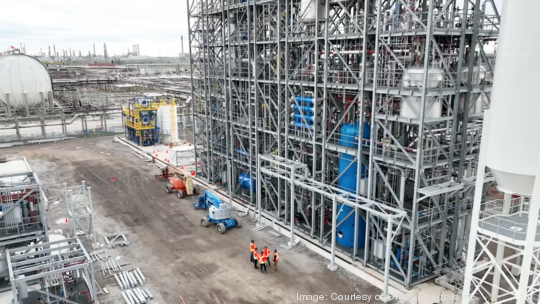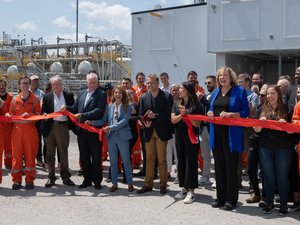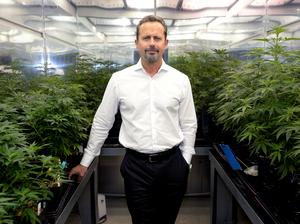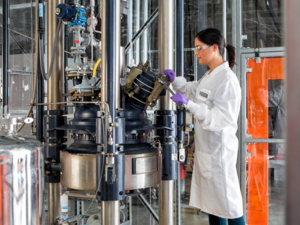
West Sacramento-based zero-carbon chemical company Origin Materials Inc. has reduced its workforce by 30%, or 60 positions, as part of an organizational realignment that defers research programs to get to operating profitability faster.
A 2008 startup, Origin (Nasdaq: ORGN) in October opened its first production-scale factory of zero-carbon plastic precursor chemicals in Sarnia, Ontario.
“We really need to try to be efficient to get to profitability sooner,” co-CEO John Bissell told the Business Journal.
The cost-cutting move is part of an effort to focus on near-term revenue opportunities and cash management, he said.
Origin's losses from operations totaled $38.7 million through the first three quarters of this year. As of Sept. 30, the company had $66.1 million in cash and cash equivalents on its books, down from $107.9 million at the end of 2022.
Bissell declined to say when he expects Origin to achieve operating profitability.
“Right now, cash is king," he said.
The cuts were driven by higher costs of capital in the current market and in higher costs for equipment. Origin is now designing the development of a new $1.6 billion factory in Louisiana. Its Sarnia plant cost $130 million to develop.
“We have taken action to reduce certain expenses and reallocate resources," Bissell said. The company will also work to accelerate higher-margin revenue opportunities.
Origin Materials makes zero-carbon plastic out of renewable plant materials, rather than petroleum. Its patented process is used to make a drop-in replacement for several kinds of plastic precursors, including for PET plastic, which is used in everything from bottles and packaging to textiles and tires. The company's product uses scrap wood or other organic products as a replacement for petroleum.
After years of developing its technology, Origin completed its first factory early this year in Canada. It announced in October that it moved up to commercial-scale production at its first zero-carbon plastic chemical plant that uses scrap wood as its source.
Origin said it expected the workforce changes to be largely completed Nov. 20. The layoffs include positions in West Sacramento, and some engineering positions in Houston.
Origin has also been working to develop other chemical replacements, and it is too costly to try to develop multiple commercialization strategies simultaneously, Bissell said. He declined to say what other endeavors it is putting on the shelf. Bissell said the company can continue to work on research and development of new technologies, but commercializing them is on hold.
Origin anticipates that it will incur approximately $2.7 million in restructuring charges in connection with the roughly 30% workforce reduction, consisting of cash expenditures for employee separation costs of approximately $500,000 and non-cash expenses for the accelerated vesting of certain equity awards of approximately $2.2 million.
"The fundamentals of our business and the global macro drivers of our carbon-negative materials platform remain strong," said Bissell, in a news release. "We are confident in the health and long-term success of the business as we approach the $1 trillion addressable market for our sustainable alternatives to petroleum-based materials."
Origin made the job reduction announcement after the close of stock markets Monday. Origin shares fell 6 cents on Monday to close at 98 cents.
Origin shares fell sharply in August after the company announced that it also intends to begin selling other low-carbon chemical products and also low-carbon transportation fuel sourced from its next manufacturing plant, which is to be built in Louisiana.
Analysts in August said renewable fuel was a less profitable and more competitive market than plastic replacement, which hurt the stock price, along with the company offering a longer timeline for construction of the company's second plant.
Bissell said in October that Origin creates in-demand chemical products and renewable fuel precursor chemicals in the process of making its intermediate chemicals to replace petroleum in plastic. The company’s decision to venture into renewable fuel was a reaction to the market demand as Origin seeks to get to profitability sooner.
The company is still interested in adding sustainable fuels to its product mix, which will help it get to profitability, Bissell said. But it can’t count on that in the near term because those projects have not yet been developed.
In August, Origin announced it would build its Louisiana plant in two phases rather than all at once. The company said the change in plans was a response to higher construction and capital costs as well as changes in product demand. The first phase is estimated to open in 2026 with full completion of the Louisiana plant estimated for 2028. That was compared to the previous estimates for the full second plant opening in 2025.
Origin has financial backing from users of plastic materials, including Mitsubishi Group, Nestle SA, Danone SA and PepsiCo Inc. (Nasdaq: PEP), all of which are potential customers for Origin’s zero-carbon PET for industrial goods and packaging.









